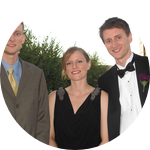About This Project
Did you know that your DNA contains thousands of human endogenous retroviruses? These viruses are active in the brains of people with neurological diseases like ALS and Schizophrenia. Our lab has recently discovered a novel human endogenous retrovirus protein, and using confocal microscopy we will attempt to determine if this neurotoxic protein is associated with neuronal damage and inflammation in brain tissue.Ask the Scientists
Join The DiscussionWhat is the context of this research?
Inside our DNA resides thousands of human endogenous retroviruses. In certain neurological diseases these normally dormant viruses become re-activated. Our goal is to assess the pattern of endogenous retrovirus protein expression in the brain tissue of neuro-normal controls and patients with Amyotrophic Lateral Sclerosis (ALS/Lou Gehrig's Disease) and Schizophrenia. We have recently discovered a novel human endogenous retrovirus protein, and using custom antibodies we will attempt to determine if this neurotoxic protein is associated with neuronal damage and inflammation in the brain.
What is the significance of this project?
Reactivation of endogenous retroviruses in the brain may be a substantial and unappreciated contribution underlying the pathology of ALS and Schizophrenia. If successful, this will be the first study to concretely show that expression of a neurotoxic protein from endogenous retrovirus-K is associated with damage to the central nervous system. These findings have important implications for enhancing our understanding of neuron survival, interneuron signalling and neuroinflammation in the context of endogenous retrovirus activity. A long-term objective of this research is to lay the biomedical foundation for the design of novel anti-retroviral therapies to treat neurological diseases.
What are the goals of the project?
Our confocal microscope technician, Jennifer Ferguson, is currently working on a part-time basis supported by funds from the Manitoba Health Research Council (MHRC). As Dr. Douville's maternity leave approaches, we are seeking additional funds to have Jennifer employed on a full-time basis. This will ensure the necessary expertise and trainee support is present in the laboratory in the upcoming year. Extra antibodies and imaging reagents will also be purchased in anticipation of enhanced research capacity.
This investment into the Douville lab will promote a research atmosphere dedicated to training the next generation of Canadian neurovirologists. This will give hope to the thousands of individuals living with chronic neurological diseases that seek improved treatments and outcomes.
Budget
Our confocal microscope technician, Jennifer Ferguson, is currently working on a part-time basis supported by funds from the Manitoba Health Research Council (MHRC). As Dr. Douville's maternity leave approaches, we are seeking additional funds to have Jennifer employed on a full-time basis ($10,000). This will ensure the necessary expertise and trainee support is present in the laboratory in the upcoming year. Extra antibodies ($4,000) and imaging reagents ($1,000) will also be purchased in anticipation of enhanced research capacity.
Meet the Team
Team Bio
The Douville Lab TeamDr. Renée Douville completed her PhD in Immunology at the University of Manitoba. After reading the novel Darwin's Radio, she developed a passion for human endogenous retroviruses, and continued her postdoctoral studies in that field at Johns Hopkins University in Neurology. Her second postdoctoral fellowship at McGill University focused on the innate immune response against human retroviruses.
Having now established her own research laboratory at the University of Winnipeg, our research program remains focused on developing an understanding of the role of human endogenous retroviruses in neurological disease. The lab team consists of both undergraduate, graduate and BSc Medicine students, as well as our confocal microscopy technician. Training for Douville team members includes weekly lab and one-on-one meetings, hands-on training in cell culture, molecular biology and microscopy, and motivational Starbucks coffee breaks.
Dr. Renée Douville
The Douville Lab Team
Dr. Renée Douville completed her PhD in Immunology at the University of Manitoba. After reading the novel Darwin's Radio, she developed a passion for human endogenous retroviruses, and continued her postdoctoral studies in that field at Johns Hopkins University in Neurology. Her second postdoctoral fellowship at McGill University focused on the innate immune response against human retroviruses.
Having now established her own research laboratory at the University of Winnipeg, our research program remains focused on developing an understanding of the role of human endogenous retroviruses in neurological disease. The lab team consists of both undergraduate, graduate and BSc Medicine students, as well as our confocal microscopy technician. Training for Douville team members includes weekly lab and one-on-one meetings, hands-on training in cell culture, molecular biology and microscopy, and motivational Starbucks coffee breaks.
Jennifer Ferguson
I'm a born and raised Winnipegger with a long time love of Science. I recently graduated from the University of Winnipeg with a Masters' degree in Bioscience. When I'm not in the lab I like to spend my time playing my favorite sport, badminton, or making chocolate creations at the family chocolate factory.
Sheena Manghera
Ever since I can remember, I've been fascinated by the fact that a major proportion of our DNA is actually of viral origin - known to the scientific community as the human endogenous retroviruses (ERVs). Surprisingly, ERVs comprise over 8% of our DNA, whereas only 1% of our DNA actually codes for our own proteins. On top of that, these retroviral-derived sequences govern the very nature of our existence! Placental mammals, including humans, may not have come into existence without the aid of the ancient retroviruses. This is because human genes that encode for proteins crucial for placental formation are derived from an ERV. In addition to providing such biological benefits to their human hosts, some ERVs have also been speculated to be associated with a variety of diseases, ranging from neuro-degeneration and rheumatic disease to multiple types of cancers. Although majority of ERVs have been silenced through accumulation of mutations over evolutionary time, some belonging to the ERVK group have been shown to be re-activated under inflammatory conditions. Unfortunately, we do not yet understand the mechanism(s) behind their re-activation. Thus, a major focus of my research is to determine which human cellular proteins induce ERVK in our cells during inflammation. In addition, my motivation for choosing this research path stems from the fact that I have a long family history of ERVK-associated diseases, particularly arthritis and lupus. Overall, this research is worthy of recognition and support because of its novelty and importance in understanding the pathogenic processes behind ERVK-associated diseases.
Samah Alsaadi
A Graduate Student working with Dr. Renée Douville on Human Endogenous Retrovirus (ERV).
Matthew Turnbull
My interest in science started with Paleontology, but was soon stolen by Molecular Biology, and has remained there ever since. Viruses are fascinating because they display such complicated behavior arising from such simple components. Their evolutionary history as a group is also fascinating!
Heather Carr
As a young person living with schizophrenia, I am passionate about the research surrounding this illness. I am currently working on my Honours BSc in Biochemistry at the University of Winnipeg in the lab of Dr. Renee Douville.
Michael Jonasson
I am very passionate about the field of microbiology. My interest in endogenous retrovirus research began when I was taking Dr. Douville's Prokaryotes and Viruses course at the University of Winnipeg. I have now joined the Douville lab team as an honours thesis student, where I am studying the neurotoxic protein recently discovered by our lab.
Additional Information
Relevant Douville Publications:- HERV and inflammation: http://www.ncbi.nlm.nih.gov/pubmed/23394165
- HERV and ALS: http://www.ncbi.nlm.nih.gov/pubmed/21280084
Check us out on:
- Website: http://douvillelab.webstarts.com/index.html
- Twitter: @douvillelab
- Facebook: Douville Lab
Project Backers
- 11Backers
- 5%Funded
- $636Total Donations
- $57.82Average Donation





